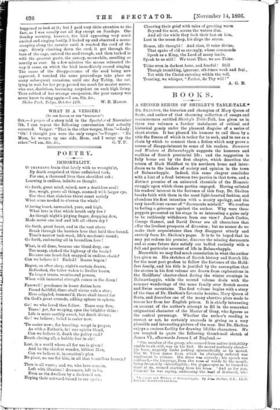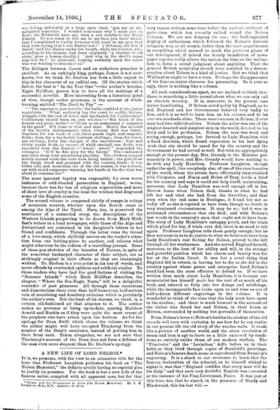BOOKS.
A SECOND SERIES OF SHIRLEY'S TABLE-TALK.0 Da. SKELTON, the historian and champion of Mary Queen of Scots, and author of that charming collection of essays and. reminiscences entitled Shirley's Table-Talk, has given us in these two volumes a further instalment of critical and historical gossip under the pleasant disguise of a series of short stories. It has pleased his humour to call them by a. title the fitness of which is rather far to seek, and to use as a chain by which to connect them a fiction which may prove a source of disappointment to some of his readers. Summers- and Winters at Balmawhapple suggests the humours and realities of Scotch provincial life ; and the suggestion is- fully borne out by the first chapter, which describes the return of Mark Holdfast to his northern home and intro-- duces us to the leaders of society and opinion in the town of Balmawhapple. Indeed, this same chapter concludes with a hint of a feud between two parties in that town, and a distinct promise of an animated chronicle of the Homeric- struggle upon which those parties engaged. Having enlisted his readers' interest in the fortunes of this fray, Dr. Skelton breaks faith with them in the most light-hearted fashion, and abandons his first intention with a scanty apology, and the very insufficient excuse of "documents mislaid." We confess to feeling a grievance against the author. Why were these puppets presented on his stage in so interesting a guise only to be ruthlessly withdrawn from our view ? Jacob Corbie, George Gannet, and David Dewar are all characters that offer the liveliest prospects of diversion ; but no sooner do we make their acquaintance than they disappear utterly and entirely from Dr. Skelton's pages. It is to be hoped that he may yet redeem his promise, discover the missing documents and at some future date satisfy our baffled curiosity with full and particular account of life in Balmawhapple.
Meanwhile we may find much consolation in what the author- has given us. His sketches of Scotch history and Scotch life for the most part profess to follow the fortunes of the Hold- fast family, and his title is justified by the assumption that the stories in his first volume are drawn from explorations in the Holdfasts' charter-chest during the winter evenings in Balmawhapple, while the second volume deals with the summer wanderings of the same family over Scotch moors and Swiss mountains. The first volume begins with a story of the time of Dr. Skelton's favourite heroine, Mary Queen of Scots, and describes one of the many abortive plots made to rescue her from her English prison. It is chiefly interesting on account of the author's attempt to fill in the somewhat enigmatical character of the Master of Gray, who figures as the central personage. Whether the author's reading is correct or not, he certainly succeeds in giving us a very plausible and interesting picture of the man. But Dr. Skelton enjoys a curious facility for drawing lifelike characters. We are tempted to quote the following thumb-nail sketch of James VI., afterwards James I. of England :—
" One member of the group, who seemed from native irritability unable to sit still, was on his feet. He moved restlessly about— his loose, ungainly limbs jerking spasmodically as he moved. The St. Vitus dance from which he obviously suffered was unpleasant to witness. His dress was slovenly; his speech was confused,—the language, from the rum vi words to the mouth,. being frequently unintelligible ; the gog-Ele-eyes as be turned to- stare at us, seemed starting from his heatt. And as for you, Francie,' he was saying, addressing the Nail of Bothwell, who.
*Simmers and Winters at Balmatdapple. By Jon. Aketon, C.B , LL.M. Land.aa : lEackwood and Suns. WM lolling indolently in a huge open chair, you are an un- mitigated reprobate. I wonder sometimes why I made you an Earl ; the Bothwells have aye been a sair trouble to the Royal Family. Do you mean to tell me to my face, you leein' knave, that I complained to Cuddy Armorer with tears in my eyes that they were saying that I was Davies' son ? ' (' Solomon, the Son of David,' said the Master under his breath, while the Colonel, who, according to his enemies, had been originally a cloutter of old shoes,' gave a hoarse chuckle.) And wha in the devil's name may this be ? ' he stuttered, turning suddenly upon the usher who was waiting to introduce us."
The dialogue between James and an audacious preacher is excellent. As an unkingly king, perhaps, James is not over-
drawn, but we think Dr. Skelton has been a little unjust to him in his character of an unfilial son. Of the stories which follow, the best is "In the Year One "—the author's heroine, Eppie Holdfast, proves him to have all the makings of a socceseful novelist. More interesting from a historical point of view, though rather gruesome, is the account of witch- burning, entitled "The Devil to Pay" :— "'The expense is just terrible.' the bailie confided to the junior magistrate. What authority has the court to saddle Bdina- whapple with the cost of towes and tar-barrels for Cuddiestane ? Cuddiestane should burn its own witches.'—' But think of the honour and glory, bailie !'—' Think on an assessment o' saxpence in the pund ! It'll come to that and mair. Here's the account of the broch's disbursements when Christy Bell was brunt. Imprimis, for ten loads of coal, three ponds eight and saxpence Scots; item, for a tar-barrel, fourteen shillings ; item, for towes, sax shillings, forby the charges of the executioner ; four and thirty punds Scots, is sunzma, of whilk one-half, nae doobt, was recovered from the Session.'—' Aweel ! aweel ! ' responded his colleague. It'll be fine ploy for the bairns.' The condemned met their doom with astonishing placidity. The children romped noisily around while the irons were being heated ; the girls from the burgh stood and gossiped with the country hinds; it was bitter cold, and more than one of the old women, it was noticed, sat with stolid composure warming her hands at the fire that was about to consume her."
The same ignorant bigotry was responsible for even worse instances of cold-blooded persecution in England; worse, because there was far less of religious superstition and more of sheer love of cruelty in the hunt for witches that disgraced some of the English counties.
The second volume is composed chiefly of essays in eulogy of mountain scenery, whether upon the Scotch coast or among the Alps of the Tyrol. Here, too, is preserved the semblance of a connected story, the descriptions of the Western Islands purporting to be drawn from Mark Hold- fast's letters to a local newspaper, while those of the Alps and Switzerland are contained in his daughter's letters to her friend and confidante. Through the latter runs the thread of a love-story, which skilfully carries on the reader's atten- tion from one halting-place to another, and relieves what might otherwise be the tedium of a travelling-journal. Some of these pen-sketches of the beauties of Nature, in spite of the somewhat hackneyed character of their subject, are as strikingly original in their effects as they are charmingly written. Dr. Skelton is a true artist in his use of words, and never offends by overloaded epithets and artificial similes. To those readers who have had the good fortune of visiting the "Summer Islands" which Mark Holdfast describes, the chapter, "Where the Sea-Eagle Nests," will be a delightful reminder of past pleasures. All through these excursions and dissertations there runs that half-humorous, half-serious vein of moralising and desultory criticism which is peculiarly the author's own. Not the least of its charms, we think, is a certain old-fashioned air that attaches to it. The author makes no pretence at being up-to-date, quoting Matthew Arnold and Rnskin as if they were quite the most recent of the prophets who have arisen upon the horizon. As for the apology for Dean Swift which closes the volume, we think the author might well have excepted Thackeray from the number of the Dean's assailants, instead of putting him in their front rank. Taken altogether, we are not sure that
Thackeray's account of the Dean does not form a defence of the man even more eloquent than Dr. Skelton'e apology.







































 Previous page
Previous page